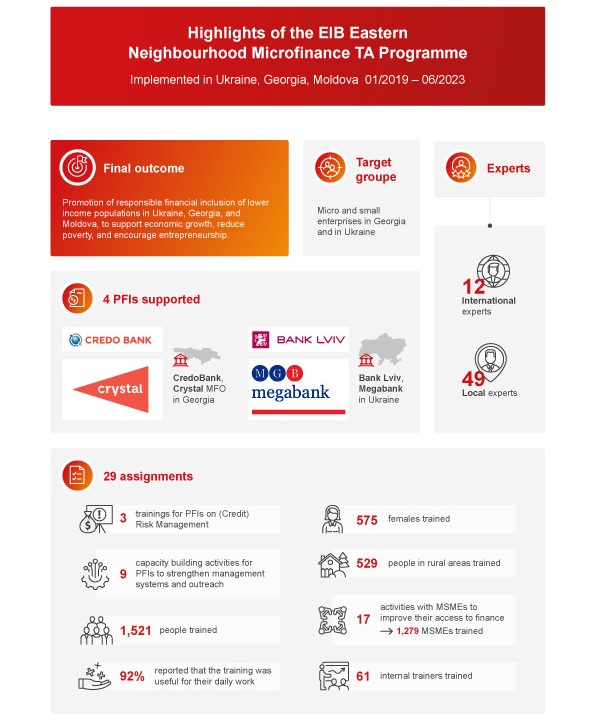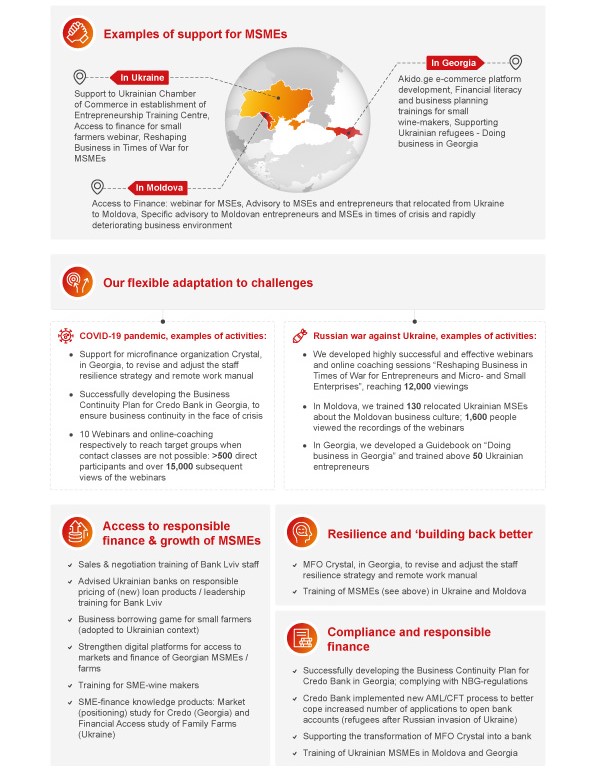
In times of challenges and uncertainties, initiatives that empower local economies and foster financial inclusion become ever more important. The Eastern Neighbourhood Microfinance Technical Assistance (ENTAFI) Programme, launched by the European Investment Bank (EIB) in January 2019, demonstrates the positive impact targeted support can have on MSMEs in Ukraine, Georgia, and Moldova. Over its course, the project arrived at remarkable achievements; such as enhancing business resilience and championing entrepreneurship.
Our support
ENTAFI’s overarching objective was to promote responsible financial inclusion among lower-income populations across the three Eastern European countries. The programme aimed to catalyze economic growth, alleviate poverty, and nurture entrepreneurship in the region. To achieve these goals, we worked with four partner financial institutions (PFIs) - Credo Bank and Crystal MFO in Georgia, and Bank Lviv and Megabank in Ukraine. Over a span of four and a half years, our ENTAFI team successfully executed 29 assignments, with a diverse array of tasks. This included providing training to PFIs on credit risk management, capacity building for enhancing management systems and outreach, and various projects aimed at supporting MSMEs' access to finance.
Our achievements
Overall, our project reached 1,521 individuals through training sessions, and an impressive 92% of participants reported that the training positively affected their daily work. The commitment to gender equality was evident, with 575 females participating in training initiatives. Moreover, we aimed to not limit our support to urban centers: out of the individuals trained, 529 live in rural areas.
Mate Dolidze, who participated in one of our financial literacy trainings, says: “Thanks to the training program and professional consultancy I’m now able to understand my cash flow better, identify problems and resolve them, find new markets and ways to maximize revenue opportunities”.
Navigating Challenges
During the course of the project, we had to deal with several challenges, but thanks to our great team and partners we were able to adapt quickly, which was integral to our success.
In the face of the COVID-19 pandemic, the project showcased its flexibility by assisting partner institutions in revising staff resilience strategies and implementing remote work practices. The development of a business continuity plan for Credo Bank in Georgia ensured operational resilience during the pandemic, and positioned the bank as a reliable institution, compliant with central bank requirements for times of crisis. Similarly, Bank Lviv in Ukraine saw a transformation in its management culture, with enhanced leadership skills leading to improved decision-making and teamwork. Notably, the project provided virtual training through webinars and online coaching sessions, reaching over 15,000 viewers.
The Russian war against Ukraine posed another challenge. We responded with a comprehensive approach to help Ukrainian refugees establish businesses in Georgia and Moldova. By offering tailored advisory services, conducting training sessions, and developing guidebooks, the project empowered displaced entrepreneurs to overcome adversity and rebuild their livelihoods.
Lasting Impact
The emphasis on responsible financial inclusion, resilience, and compliance has contributed to creating a more robust and inclusive business environment in Ukraine, Georgia, and Moldova.
"As we wrap up the Eastern Neighbourhood Microfinance Technical Assistance Programme, I want to express my pride in what we've accomplished together. This project shows the importance of teamwork, flexibility, and empowering businesses as the driving force of economies” concludes our senior project manager Elena Yunatska.


For further information please contact: Elena.Yunatska [at] afci.de
